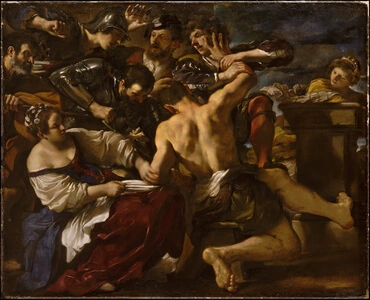1
Dies sind die Namen der Kinder Israels, die mit Jakob nach Ägypten kamen; ein jeglicher kam mit seinem Hause hinein:
3
Isaschar, Sebulon, Benjamin,
5
Und aller Seelen, die aus den Lenden Jakobs kommen waren, der waren siebenzig. Joseph aber war zuvor in Ägypten.
6
Da nun Joseph gestorben war und alle seine Brüder und alle, die zu der Zeit gelebt hatten,
7
wuchsen die Kinder Israel und zeugeten Kinder und mehreten sich; und wurden ihrer sehr viel, daß ihrer das Land voll ward.
8
Da kam ein neuer König auf in Ägypten, der wußte nichts von Joseph;
9
und sprach zu seinem Volk: Siehe, des Volks der Kinder Israel ist viel und mehr denn wir.
10
Wohlan, wir wollen sie mit Listen dämpfen, daß ihrer nicht so viel werden. Denn wo sich ein Krieg erhübe, möchten sie sich auch zu unsern Feinden schlagen und wider uns streiten und zum Lande ausziehen.
11
Und man setzte Fronvögte über sie, die sie mit schweren Diensten drücken sollten; denn man bauete dem Pharao die Städte Pithon und Raemses zu Schatzhäusern.
12
Aber je mehr sie das Volk drückten, je mehr sich es mehrete und ausbreitete. Und sie hielten die Kinder Israel wie einen Greuel.
13
Und die Ägypter zwangen die Kinder Israel zu Dienst mit Unbarmherzigkeit
14
und machten ihnen ihr Leben sauer mit schwerer Arbeit im Ton und Ziegeln und mit allerlei Frönen auf dem Felde und mit allerlei Arbeit, die sie ihnen auflegten mit Unbarmherzigkeit.
15
Und der König in Ägypten sprach zu den ebräischen Wehmüttern, deren eine hieß Siphra und die andere Pua:
16
Wenn ihr den ebräischen Weibern helfet und auf dem Stuhl sehet, daß es ein Sohn ist, so tötet ihn; ist's aber eine Tochter, so lasset sie leben.
17
Aber die Wehmütter fürchteten Gott und taten nicht, wie der König in Ägypten zu ihnen gesagt hatte, sondern ließen die Kinder leben.
18
Da rief der König in Ägypten den Wehmüttern und sprach zu ihnen: Warum tut ihr das, daß ihr die Kinder leben lasset?
19
Die Wehmütter antworteten Pharao: Die ebräischen Weiber sind nicht wie die ägyptischen, denn sie sind harte Weiber; ehe die Wehmutter zu ihnen kommt, haben sie geboren.
20
Darum tat Gott den Wehmüttern Gutes. Und das Volk mehrete sich und ward sehr viel.
21
Und weil die Wehmütter Gott fürchteten, bauete er ihnen Häuser.
22
Da gebot Pharao all seinem Volk und sprach: Alle Söhne, die geboren werden, werfet ins Wasser und alle Töchter lasset leben.







